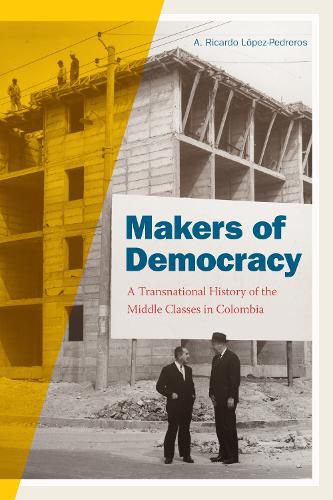Readings Newsletter
Become a Readings Member to make your shopping experience even easier.
Sign in or sign up for free!
You’re not far away from qualifying for FREE standard shipping within Australia
You’ve qualified for FREE standard shipping within Australia
The cart is loading…






In Makers of Democracy A. Ricardo Lopez-Pedreros traces the ways in which a thriving middle class was understood to be a foundational marker of democracy in Colombia during the second half of the twentieth century. Drawing on a wide array of sources ranging from training manuals and oral histories to school and business archives, Lopez-Pedreros shows how the Colombian middle class created a model of democracy based on free-market ideologies, private property rights, material inequality, and an emphasis on a masculine work culture. This model, which naturalized class and gender hierarchies, provided the groundwork for Colombia’s later adoption of neoliberalism and inspired the emergence of alternate models of democracy and social hierarchies in the 1960s and 1970s that helped foment political radicalization. By highlighting the contested relationships between class, gender, economics, and politics, Lopez-Pedreros theorizes democracy as a historically unstable practice that exacerbated multiple forms of domination, thereby prompting a rethinking of the formation of democracies throughout the Americas.
$9.00 standard shipping within Australia
FREE standard shipping within Australia for orders over $100.00
Express & International shipping calculated at checkout
In Makers of Democracy A. Ricardo Lopez-Pedreros traces the ways in which a thriving middle class was understood to be a foundational marker of democracy in Colombia during the second half of the twentieth century. Drawing on a wide array of sources ranging from training manuals and oral histories to school and business archives, Lopez-Pedreros shows how the Colombian middle class created a model of democracy based on free-market ideologies, private property rights, material inequality, and an emphasis on a masculine work culture. This model, which naturalized class and gender hierarchies, provided the groundwork for Colombia’s later adoption of neoliberalism and inspired the emergence of alternate models of democracy and social hierarchies in the 1960s and 1970s that helped foment political radicalization. By highlighting the contested relationships between class, gender, economics, and politics, Lopez-Pedreros theorizes democracy as a historically unstable practice that exacerbated multiple forms of domination, thereby prompting a rethinking of the formation of democracies throughout the Americas.